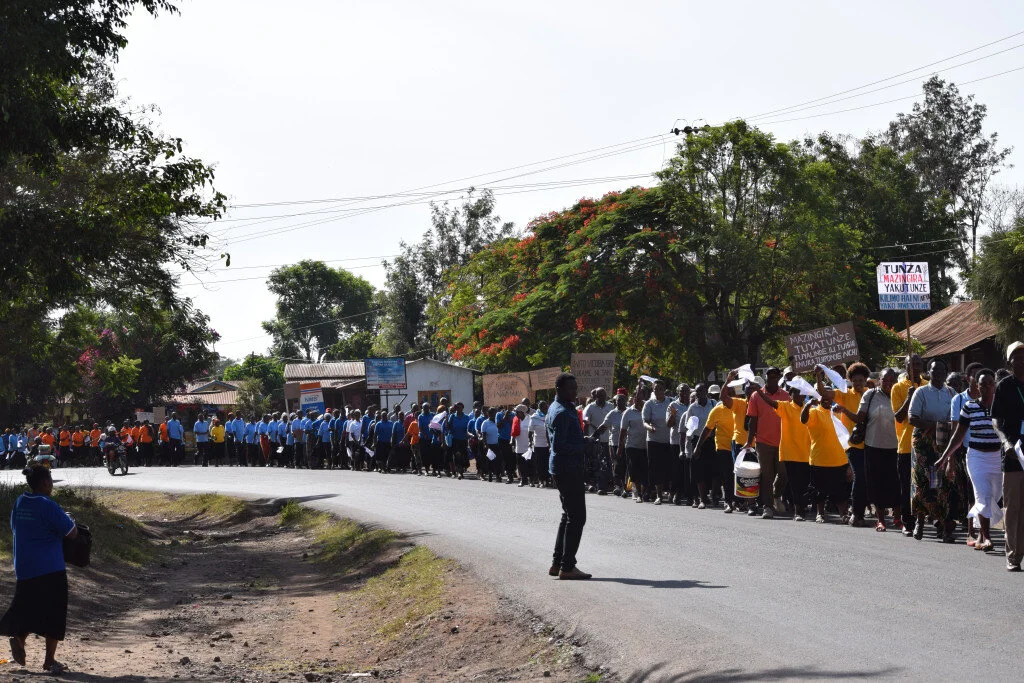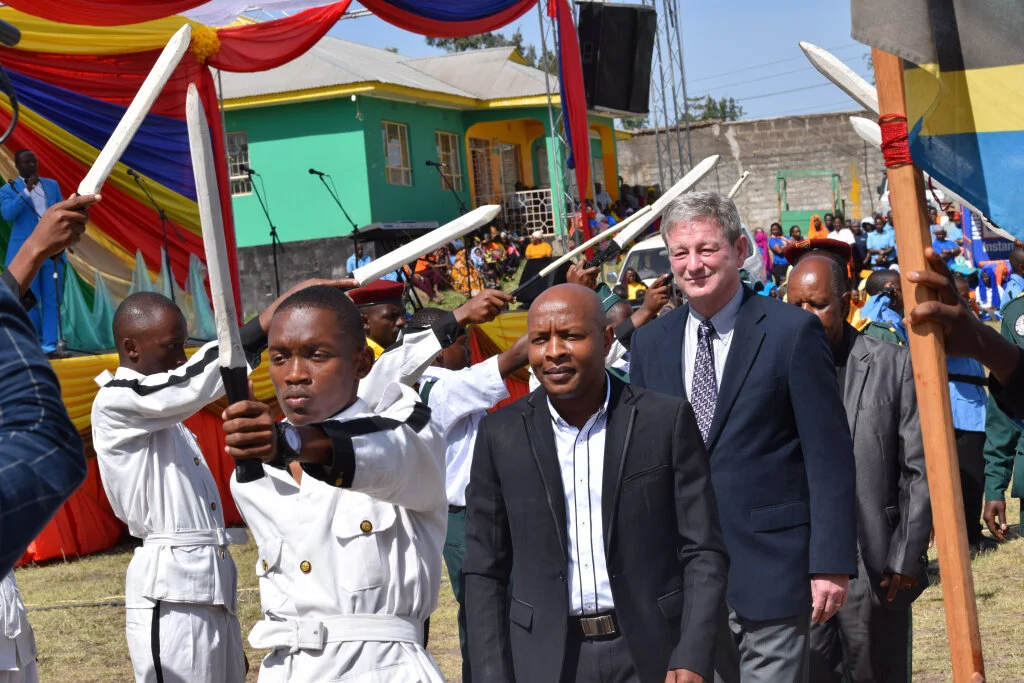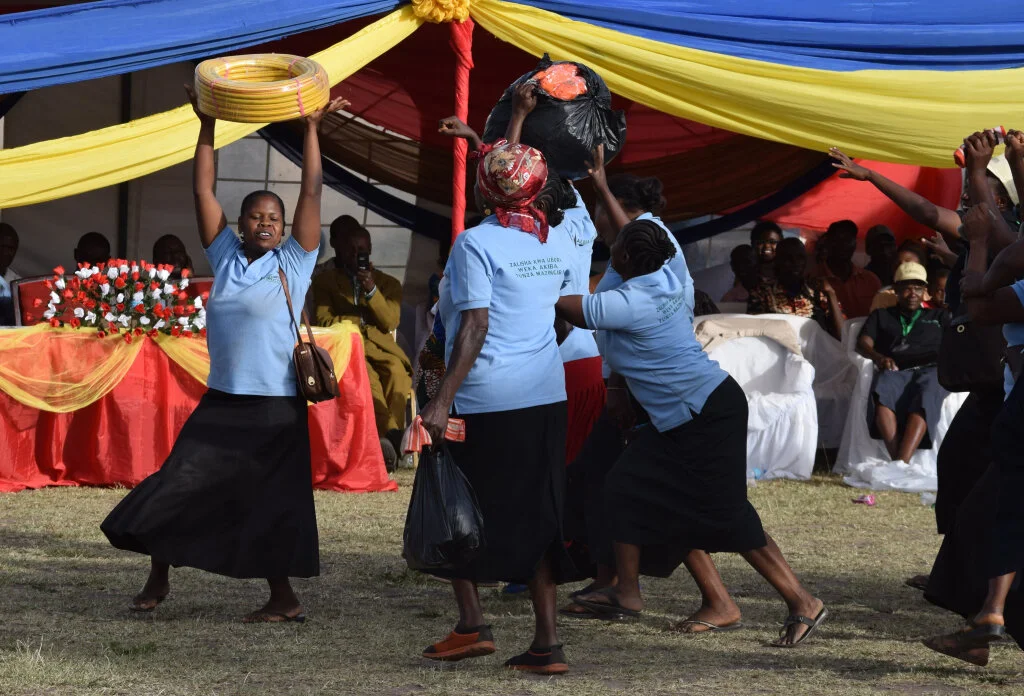Party in Sanya Juu
While driving from Moshi to Sanya Juu, Pastor Mosha, our Tanzanian board chairman briefed me on the event. “We expect 7000 people to be there.
Six thousand Plant With Purpose/Floresta participants, and hundreds of business people, pastors, government leaders and others.”
While the dusty highway towards Arusha is always busy, today it was choked with traffic. “Those busses are all carrying Floresta savings groups to the event.” Sure enough, I noticed all of the passengers were wearing Floresta polo shirts or caps.
We drove in silence for a few minutes before he spoke again. “Did Richard [our local director] tell you about the problem with the guest of honor? He had an emergency and had to cancel. So Richard and I thought that since you were here, you could fill in.”
“Um, okay. Does it involve a speech?”
“Yes but it only has to be twenty to thirty minutes, since they know there was an emergency. I can give you a copy of the bishop’s speech to give you some ideas. It is in Swahili, but your translator can help you with the main points.”
In 2013, Richard, the new director of Floresta Tanzania, had an idea to spur tree planting and program participation – friendly competition. At the time we had 140 savings groups participating, and the first year of intergroup competition, participants went from planting 400,000 trees to planting 1.4 million. Savings group participants have planted at least 1.5 million trees annually and the awards celebration has become a part of the annual calendar ever since. Although I had seen photos, this was the first opportunity I had to attend one.
It should also be noted that those trees are planted on a voluntary basis. As much as possible we have resisted paying people to plant trees, instead promoting agricultural techniques that incorporate trees on farms, and encouraging communities to undertake their own reforestation projects to restore their watersheds – and take home the annual trophy.
The soccer field in Sanya Juu was still empty of people when we arrived, but thousands of lawn chairs covered it, set up under elaborate tents, with a colorful stage and enormous sound system at one end. Along another side, vendors and farmers cooperatives were setting up booths with farm tools, tree seedlings and organic vegetables.
A half-mile away we encountered a formal procession of farmers marching towards the venue led by a brass band. I was told that part of my duty, as guest of honor fill-in, was to lead the parade, so I joined Pastor Mosha and other local board members right behind the band.
The closer the parade got to the soccer field, the more enthusiastic the marchers became, racing each other to the front of the group. I glanced behind me and was inspired by what could be almost called a movement – six thousand people brimming with excitement to celebrate what they had accomplished. It was all security could do to keep those of us in front from being overrun by the jubilant crowd behind us.
As we entered the field and were seated near the stage, Richard kept grinning at me, knowing some of the surprises to come:
The opportunity to review a drill team from one of the schools that we serve
The duty of officially cutting the ribbon to open the farmers market while being filmed by multiple local television stations
The chance to watch at least a half a dozen well-known Tanzanian gospel artists perform, led by Rose Mhando.
At last it was my turn. I have heard that as a Christian I should always be ready to preach, pray, or die at a moment’s notice, but I didn’t have to hesitate. There was so much to be said to these amazing people, who had paid their own way from all over northern Tanzania to be there. Their accomplishments were truly inspiring.
Matthew 13:31-32 came immediately to mind when I remembered the humble beginnings of the work. In that passage Jesus compares the kingdom of heaven to a mustard seed, which, though it is the smallest of seeds, grows into a tree and provides nests of birds. Everything about this program had started small. Forty-cent shares in savings groups had somehow grown to be 1.2 million dollars, and catalyzed the use of savings groups in all of our programs. A few halting attempts a setting up tree nurseries had grown into a voluntary reforestation effort that had planted 8.2 million trees.
The most fun part was telling them, that while around the world poor farmers are blamed for deforestation when they clear land for agriculture or cut trees for firewood, in Tanzania, farmers aren’t the problem, they have become the solution!
The thousands of Floresta savings group members sat with immense patience through my speech and several others and finally an extensive fundraising campaign led by a celebrity comedian and preacher.
I don’t speak Swahili, but he was funny, even filtered through my translator (my friend, Bobby, the proprietor of my favorite place to stay in Marangu, the Babylon Lodge). Of course, he took advantage of my presence to go off on a long tangent making fun of Americans, to the amusement of the assembled crowd, before hitting me up for a contribution to the cause. He then went individually to the pastors and business people in attendance, putting each on the hot seat as he publicly asked for a contribution to the work of Floresta.
Sometime in the mid-afternoon we at last got to the part that the people had come for – the announcement of the 2017 award winners.
At last it was time for the awards. Richard, the director of Floresta Tanzania, Pastor Mosha, our board chair, and I took the stage to hand out the awards.
Anticipation was in the air. Sixty-five hundred people crowded closer… Then one of them apparently tripped over a cord, because suddenly we were without sound.
Ten minutes went by, then fifteen, while technicians fiddled with cords and cables. The MC briefly tried shouting.
They decided to break for lunch, which was catered by several savings groups.
As I ate in one of the tents with some of the other pastors and VIPs, a local commercial bank which was set up in the same tent was taking photos of new account holders right behind us.
Forty-five minutes later we were ready to try again.
Since our first competition in 2013, I have been amazed at the way it has energized people. Often times in East Africa, nonprofits like ours, use subsidies to get things done. If you hold a conference or a workshop, attendance goes up if you give people a free lunch and pay them per diem or a stipend. If you have training – pay a stipend. I have even heard of people who make their living on per diems as they go from one training or workshop to the next. Similarly, if you want to have people plant trees you will certainly need to pay a stipend.
But Richard, who was working on his MBA at the time, had the idea to incorporate friendly competition instead. As I shared earlier, the results were dramatic and immediate, with groups planting nearly four times as many trees the following year.
A trophy, some tools and some recognition have created genuine excitement. There are several awards for every district. There are individual awards and group awards, awards for the best composting and most trees planted, and even awards for people who have persevered in planting trees in drier more challenging climates. Thirty-four in all, starting with certificates, and then awards that included tools like hoses and irrigation equipment. Each was greeted with joyous dancing and celebration. Often times group members would come running from all over the crowd before uniting in celebration in front of the stage.
Then finally the grand prize trophy. The group ENJOM from Siha took it home this year.
Almost ten hours after the initial parade the celebration was drawing down. The gospel singers and choir members were still singing and dancing up on the stage, being filmed by a drone, as we made our way to the exit. Each of the savings groups was finding their own busses, and based on previous conversations, each was leaving with a renewed commitment to win the grand prize home next year.











